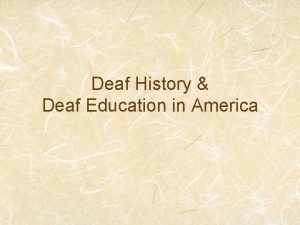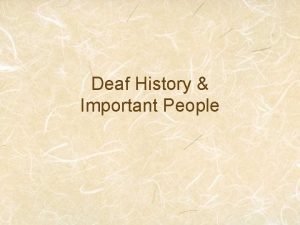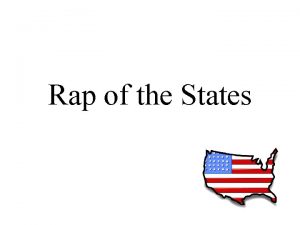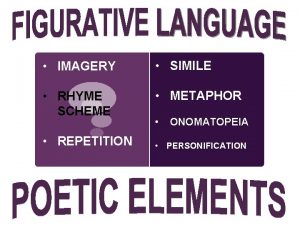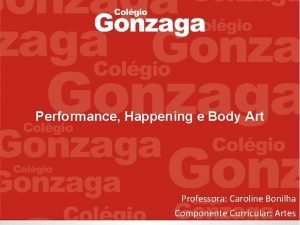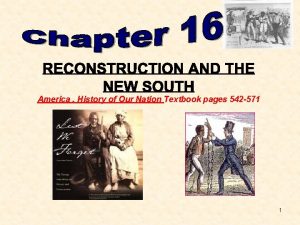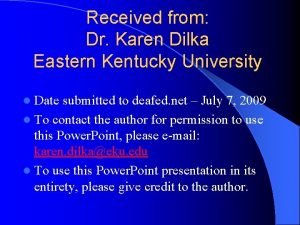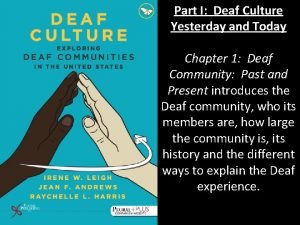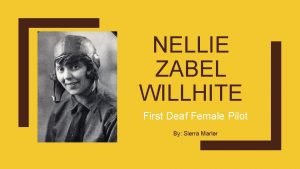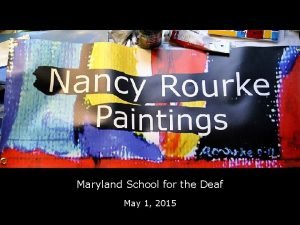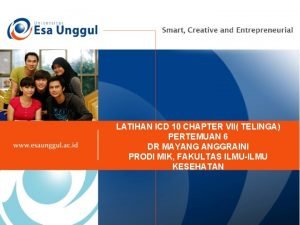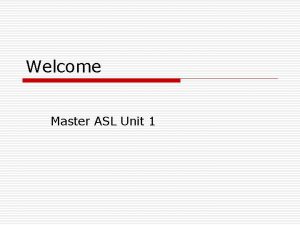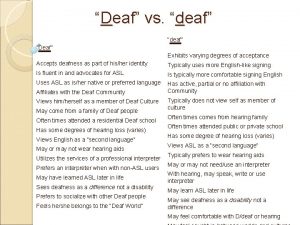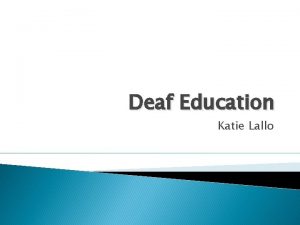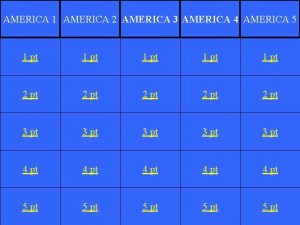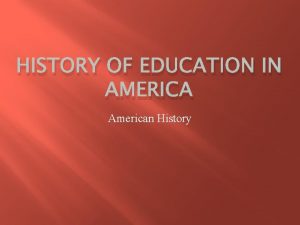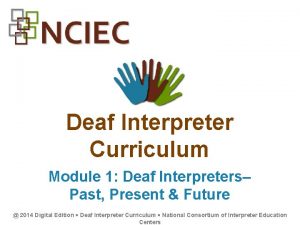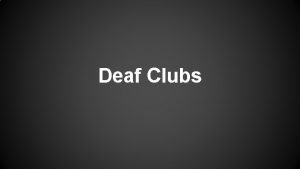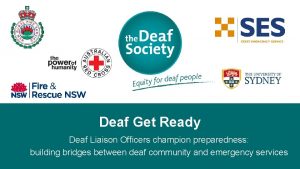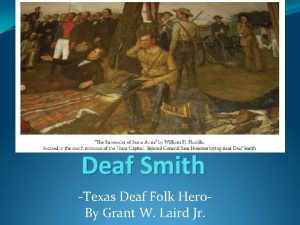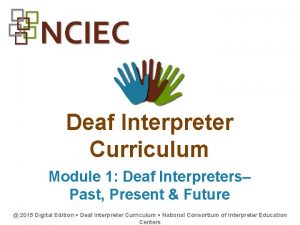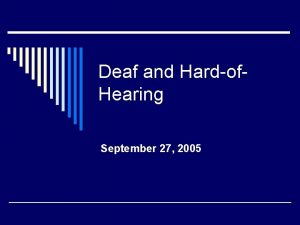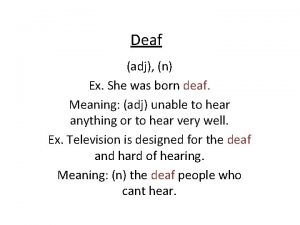Deaf History Deaf Education in America American School

















- Slides: 17

Deaf History & Deaf Education in America

American School for the Deaf • Gallaudet and Clerc return to America and founded the American School for the Deaf in Connecticut. • Subjects included: math, reading, writing, geography, history, bible/religion • President Monroe visited school. First school to receive $$ for land for school from the gov’t. • 1 st school for the deaf in US. • Opened in 1817 • Birthplace of American Sign Language

ASL/French Influence • Laurent Clerc • 2/3 of ASL signs have French origins • • Thomas Gallaudet Laurent Clerc Edward Gallaudet Are known for improving deaf education and encouraging equal rights for deaf.

Expansion of Deaf Education • • New York 1818 Pennsylvania 1820 Kentucky 1823 Ohio 1827 Virginia 1838 Indiana 1843 In 40 years, 20 schools were open in the US. The majority of deaf students attended residential schools. By 1860, deaf teachers represented 40% of the teachers for the deaf http: //www. pbs. org/weta/throughdeafeyes/ deaflife/community. html

Amos Kendall • Donated 2 acres of land for school and housing for 12 deaf and 6 blind students • Most of these children were adopted by Amos • Amos Kendall asked Edward Gallaudet to be the superintendent

Gallaudet College 1864 • Abraham Lincoln signs the charter for the college of the deaf in Washington D. C. • It is the only accredited university for the deaf in the United States to offer college degrees. • The first president of the university is Edward Gallaudet, son of Thomas Gallaudet.

• 1864 President Lincoln gave the school permission to offer college classes. • 1869 first college degrees were awarded Diplomas are signed by the President of the US • 1894 Name was changed to Gallaudet College • First college for the deaf in the World!! • 1986 Renamed to Gallaudet University

A change in the teaching approach • encouraged deaf to avoid learning to speak • Encourage deaf to only socialize with each other • Marked them as different • Encouraged romance with other deaf therefore increasing • Speech and lipreading started in the 1860 and 1870’s. • By 1920, 80% of deaf were not taught sign language. • However outside of school deaf continued to sign

Alexander Graham Bell 1870’s • Inventor of the telephone. • Famous, wealthy, influential • He studied sound acoustics ( so did his dad and grandfather – it was called elocution) • Developed a mechanical man that had a skull, lips, could speak when air was pushed through life like head

AGB background • Mother experienced a gradual hearing loss from the time he was 12 • In 1872, Bell opens a school in Boston that focuses on oral methods for the deaf. • Helped his dad with Visible Speech • He believed without speech, you can’t participate in society. • * He was against banning deaf marriage as he felt it was impractical.

Beliefs and Techniques • Deaf could learn to speak • Deaf should not use signs or gestures • Deaf need to learn to assimilate into the hearing world. • Techniques • Typing hands behind the back to prevent children from making signs/ gestures

AGB – Oral Schools • Visited private oral schools in London • Massachusetts 1867 ( 1 st private oral school in US) • Boston (1 st public oral school in US 1869) • 1872 opened his own school in Boston ( 30 students) • Then… he met Helen Keller

AGB warning… 1880 • Deaf people are forming clubs • Deaf people are socializing with each other • Deaf people are marrying each other http: //www. pbs. org/weta/throughdeafey es/deaflife/bell_nad. html http: //www. rootedinrights. org/alexander -graham-bell-and-the-deaf-community-a -troubled-history/ • He was given 3 days to present his philosophy. Sign language was given 3 hours. Conference of Milan voted to ban … • Sign language • Deaf teachers • Residential schools • 100 year ban debate still continues today.

Results of Milan • Hearing teachers only • Women are cheaper (1/2 the salary) • Women are more patient • Need to provide oral training (repetitive, hard) • Gallaudet continued “saved” sign language • By 1920, 80% of deaf children were taught without sign language. • Less than 15% of students were in residential schools. • http: //www. pbs. org/weta/throughdeafeyes/d eaflife/women. html

The Milan conference • First international meeting • Represented Italy, France, Britain, Sweden, Belgian, Germany , US • 5 delegates from America • US and Britain - signs • 164 people in attendance • Planned and organized by the Perierie Society (against sign language) • More than ½ of people who were invited were oralist supporters • Included 12 people – 9 oral and 3 sign language

National Association of the Deaf • Civil rights organization for deaf and hard of hearing • Established in 1880 to give the deaf community the right to sign, meet and have a voice • https: //nad. org/about-us • • Topics include Education Employment Health care Housing Technology Telecommunications Transportation/Travel

Deaf Employment Rises 1910 • Deaf people are not allowed to serve in the U. S. military during World War I and World War II, but labor shortage offers new job opportunities for deaf. Many take manufacturing jobs, and new deaf communities flourish.
 Founded the first american school for students who are deaf
Founded the first american school for students who are deaf Who was the first deaf teacher in america?
Who was the first deaf teacher in america? Aristotle deaf
Aristotle deaf Rap of the map of the us
Rap of the map of the us North america south america europe asia
North america south america europe asia Repetition in let america be america again
Repetition in let america be america again Why called latin america
Why called latin america Performance e body art
Performance e body art How long have native american been living in america
How long have native american been living in america America history of our nation textbook
America history of our nation textbook Dr andrew foster deaf
Dr andrew foster deaf James denison deaf
James denison deaf First deaf female pilot
First deaf female pilot Deaf time
Deaf time Icd 10 telinga berdenging
Icd 10 telinga berdenging Dr andrew foster deaf
Dr andrew foster deaf Hear us from heaven jared anderson
Hear us from heaven jared anderson Asl gloss examples
Asl gloss examples
